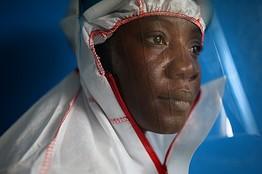The number of new Ebola cases in West Africa's outbreak region stayed in the single digits last week, but two of the infections involved high-risk health-setting exposures, which has medical officials bracing for more cases, the World Health Organization (WHO) said today.
A total of three lab-confirmed Ebola illnesses were reported last week, up slightly from the two reported the previous week. Two were from Guinea and one from Sierra Leone. No new cases have been reported from Liberia since the middle of July, and as of Aug 3, the monitoring period has ended for all contacts there.
The WHO added that the total for the previous week has been revised upward from two the three, after one retrospective case from Sierra Leone's Tonkolili district were added to that country's tally.
Overall, the number of confirmed, probable, and suspected cases in the three most affected countries stands at 27,929, including 11,283 deaths, according to the WHO. No new healthcare worker infections were reported for the second week in a row, keeping that total at 880, including 512 deaths.
New case details
Adding to concerns about further transmission, only one of the three cases reported last week—a patient from Guinea—involved a registered contact, the WHO said. However, it added that the patient was lost to follow-up and could have triggered many high-risk contacts in several health centers in Conakry, the country's capital, since the individual was seen at several health facilities while symptomatic and before the disease was confirmed. Several of the contacts are healthcare workers.
Guinea's other case was found after a 26-year-old woman in Forecariah district died in the community, raising fears of an undetected transmission chain in one of the country's recent Ebola hot spots. Responders suspect that her illness and death are linked to a family member's unsafe burial several weeks ago.
Sierra Leone's latest case-patient, from Freetown, is an 8-month old girl who got sick on Aug 4 and was admitted to the hospital 2 days later. The WHO said the illness is linked to a known transmission chain in Western Urban Area and that so far 29 of her high-risk contacts have been identified, including 24 in voluntary quarantine.
Sierra Leone lifts gathering ban
In a sign of further recovery from the outbreak, Sierra Leone's president on Aug 7 lifted a ban on public gatherings that was put in place more than a year ago to limit the spread of Ebola, the UK-based Guardian reported Aug 10.
The step cleared the way for sporting and other events to resume, but the government has extended the state of emergency, which includes restrictions on some events, such as traditional burials and Sunday markets, according to the report.
WFP on food security
In a report today from the WHO's Interagency Collaboration on Ebola (ICE) that was e-mailed to journalists, health officials reported the findings of food security assessments in Liberia and Sierra Leone in the wake of the Ebola outbreak. In early August, the United Nations Mission for Emergency Ebola Response (UNMEER) ceased operations, handing off its duties to WHO and its partners who make up ICE.
The World Food Program (WFP) surveys were conducted in Liberia in May and in Sierra Leone in March and April. The Liberia survey found that those directly affected by Ebola were more likely to report food insecurity, with the WFP recommending that Ebola-affected households be prioritized, without excluding households that are indirectly affected.
Meanwhile, Sierra Leone's survey found that food security deteriorated during the Ebola outbreak, but it didn't follow the geographic spread.
See also:
Aug 12 WHO Ebola situation update
Aug 10 Guardian story


















